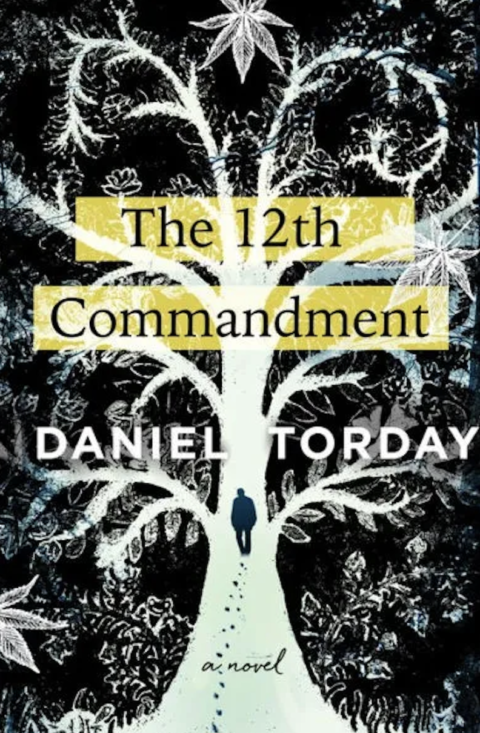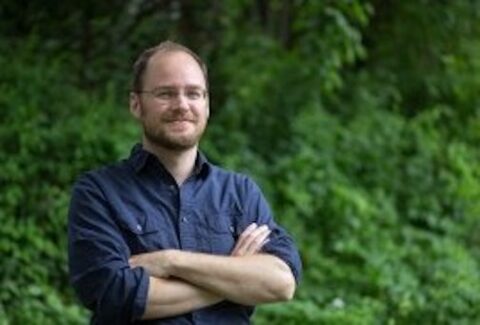Daniel Torday’s third novel, The 12th Commandment, examines the possibility of newfound faith in defiance of our cynical age through the story of a sensational scandal at the settlement of an isolated Jewish-Muslim sect in rural Ohio. The Sunday comic-style map in the opening pages, “surveyed and mapped by the author,” sets the tone for the sometimes irreverent but ultimately reverential journey ahead. For here lies the dragon, or at least its cave, the future site of a Dönme mosque, the incongruously named Bosperus Creek, a sheep meadow next to Ohio State Route 36, and an “X” marking the spot of the recent murder of the sect leader’s son.
 This spirited third-person narrative begins with Zeke, a New York “reporter. A magazine editor. Well, a writer and an editor,” who is injured when his airport shuttle bus slides off a snowy road en route to Mt. Izmir, Ohio. The decaying town is home to Zeke’s alma mater, William James College, and the fresh grave of his college buddy, Gram, whose funeral is the reason for this long delayed homecoming. Zeke is quickly pulled into the familiar campus-versus-townies dynamic, the still warm embers of his student romance with Johanna (now the district attorney), and most of all, her recent conviction of the cult’s leader who is in jail for the murder of his only son. Eager to graduate from associate editor to writing for a living, Zeke is drawn toward the charismatic Nathan Fritzman and his transplanted Brooklyn Dönme congregation. He pitches the story to his editor and starts to investigate.
This spirited third-person narrative begins with Zeke, a New York “reporter. A magazine editor. Well, a writer and an editor,” who is injured when his airport shuttle bus slides off a snowy road en route to Mt. Izmir, Ohio. The decaying town is home to Zeke’s alma mater, William James College, and the fresh grave of his college buddy, Gram, whose funeral is the reason for this long delayed homecoming. Zeke is quickly pulled into the familiar campus-versus-townies dynamic, the still warm embers of his student romance with Johanna (now the district attorney), and most of all, her recent conviction of the cult’s leader who is in jail for the murder of his only son. Eager to graduate from associate editor to writing for a living, Zeke is drawn toward the charismatic Nathan Fritzman and his transplanted Brooklyn Dönme congregation. He pitches the story to his editor and starts to investigate.
Meanwhile, the ugly gash above Zeke’s eye from his accident begins healing immediately. Something supernatural is in the air in Mt. Izmir and the newly minted journalist wastes no time in arranging a visit and communicating with Nathan through his prison email account. Every messiah needs his prophet, and Zeke is quickly engaged by Nathan’s voice in the wilderness, Jehoshua — Josh — who leads Zeke on a tour of “The Caves,” their heavily guarded compound. Sporting an “accent almost exactly the voice of Mike D from the Beastie Boys,” Josh is decidedly more frat boy Licensed to Ill than critical darling Paul’s Boutique, given the sect’s penchant for goosing their rites with homegrown mind-expanding substances and their neighbors’ distrust, hostility, and jealousy:
“The Dönme have believed, all the way back to our prophet Shabbetai Tzvi, in redemption through sin. The true Prophet, the true mashiach, could make holy all our actions through his mere belief in them. At the coming of the mashiach, all of halakhah will be undone. All that’s holy will be holy, and all that’s unholy will be holy.”
“And it’ll just be shrimp bacon cheeseburgers from there on out,” Zeke said.
Josh looked at him and held in a lungful of pot smoke until his chest convulsed just a bit. Smoke billowed from each nostril. Then he exhaled, coughed, and started to laugh.
“Hah! Nice. You’re quick. That might be good for you here.”
Much of the narrative develops, like this exchange, in a blend of densely packed religious concepts wrapped in chatty, often elliptical dialogue, punctuated by pop culture references, flippant jokes, and good natured sarcasm. Torday doesn’t hesitate to pepper his character’s speeches with what may be unfamiliar religious vernacular, creating the same disoriented sense in the reader as Zeke, who is thrown deep into the world of Dönme true believers (and possibly a nefarious conspiracy) and struggles to make sense of it all. The author’s respect for his readers’ ability to fill in the gaps in his rapid-fire conversations or enigmatic passages from Nathan’s prison missives is guided by his sense of how we perceive both music and literature.
Torday explains his approach in a recent essay, reflecting on the brain’s capacity to fill in the natural spaces between sound that exist in vinyl recordings and extends that to reading: “Our ears and eyes want to be more active participants in the art we hear or view or see…how might we achieve that effect in our writing? What kinds of gaps need to be in a piece of writing to allow the reader not to feel they’re being fed synthetic prose music?” This technique, whether in the bigger picture or in line-level editing of cutting a text “past the quick,” is a balancing act that may strike each reader with differing degrees of success. The most effective usage of this method are the nimble, respectful portrayals of Zeke’s spiritual awakening and the mysticism of Nathan’s doctrines, illustrating the unknowable inner voice guiding every person’s relationship to — or rejection of — the divine.
 Zeke’s sojourn through the wintry Ohio landscape reflects the barrens of our age’s spirituality. The novel’s sensitive exploration of Zeke’s growing sympathy towards Nathan’s stew of Kabbalah, freshman dorm room mysticism, weed-drenched theology, and purported miracles is deferential to the ways in which an individual might will a belief into existence, but whose experience of that faith remains highly personal and may not conform to the creed promulgated by a particular religion. One of Nathan’s prison notebooks encapsulates this concept: “There is no present moment:: There is no now:: Ein Sofism, like theoretical physics, tells us that as it has always been will always be there are multiple presents one present for each perceiver as there are infinite Torahs a different Torah for each reader, selah:: As there are different sets of halakhic guidelines one guideline for every follower.: There is no causation.: There is no time:: Only events:” Working through the opacity of Nathan’s pronouncements and a growing understanding of the supposed messiah’s true powers, Zeke fashions his own unique Torah, one that will see him through the disquieting revelations to come about the scandal in the midst of the Ohio Dönme community.
Zeke’s sojourn through the wintry Ohio landscape reflects the barrens of our age’s spirituality. The novel’s sensitive exploration of Zeke’s growing sympathy towards Nathan’s stew of Kabbalah, freshman dorm room mysticism, weed-drenched theology, and purported miracles is deferential to the ways in which an individual might will a belief into existence, but whose experience of that faith remains highly personal and may not conform to the creed promulgated by a particular religion. One of Nathan’s prison notebooks encapsulates this concept: “There is no present moment:: There is no now:: Ein Sofism, like theoretical physics, tells us that as it has always been will always be there are multiple presents one present for each perceiver as there are infinite Torahs a different Torah for each reader, selah:: As there are different sets of halakhic guidelines one guideline for every follower.: There is no causation.: There is no time:: Only events:” Working through the opacity of Nathan’s pronouncements and a growing understanding of the supposed messiah’s true powers, Zeke fashions his own unique Torah, one that will see him through the disquieting revelations to come about the scandal in the midst of the Ohio Dönme community.
The actual Dönme are a fascinating choice for the insular Central Ohio religious group in The 12th Commandment. The Jewish sect originated in the Ottoman Empire in the 17th century and were distinguished by their belief in mystic rabbi Sabbatai Zevi as the long-promised Messiah. More interesting in the novel’s context, though, is not what they believe but how they practice it: to avoid persecution by the surrounding Muslim society, the Dönme publicly converted to Islam while secretly maintaining their apostate Jewish rites and creeds. This dual pretense at being Muslim and Jewish makes for a precarious existence, and their closely guarded secrecy ensures that even today it is extremely difficult to study the Dönme’s practices or gauge their numbers in modern day Türkiye. In a poignant comment in the closing acknowledgements, the author thanks real-life Dönme members who helped him with research for the book, but who cannot be named for fear of endangering their lives. A masked existence is the only way they can survive. Zeke himself, in the short time he spends among the Dönme, experiences both misunderstanding from his friends about his burgeoning faith and physical violence from the suspicious community. Like the fictionalized or actual Dönme, Zeke finds it safer to conceal the truth of what he learns about them and the beliefs he comes to share.
The American Dönme community is situated within the United States’ tradition of homegrown esoteric religions. There are striking parallels, for example, between Nathan’s Dönme and Joseph Smith’s Latter-Day Saints (colloquially known as Mormons), another group that originated in New York and migrated to the more fertile spiritual soil of Ohio, Missouri, Illinois, and ultimately to the Utah wilderness in search of their own space free from persecution (and conveniently, from law enforcement). The latter-day crypto-Jewish prophet in The 12th Commandment is much more sympathetic than the numerous unhappy and violent examples of modern-day sects, and his mystical pronouncements leading to Zeke’s examined but circumscribed faith elevate a conventional mystery into a thought provoking work.
[Published by St. Martin’s Press on January 17, 2023, 304 pages, $27.99, hardcover]